Safeguarding Policy of the Elderly in UK: Policy and Practice Analysis
VerifiedAdded on 2023/04/23
|8
|2442
|94
Essay
AI Summary
This essay provides a comprehensive analysis of safeguarding policies for the elderly in the UK, focusing on the context of care facilities. It examines the legal framework, particularly the Care Act 2014, and explores various forms of abuse and neglect experienced by elderly residents. The essay highlights the responsibilities of local authorities, care home staff, and the importance of person-centered care. It uses a case study to illustrate the shortcomings of current safeguarding practices, and discusses the challenges faced by individuals with dementia. The essay also emphasizes the six principles of the Care Act and the need for a trusting environment. The references include relevant legislation, policy documents, and research papers, providing a robust foundation for understanding the complexities of safeguarding the elderly in the UK.
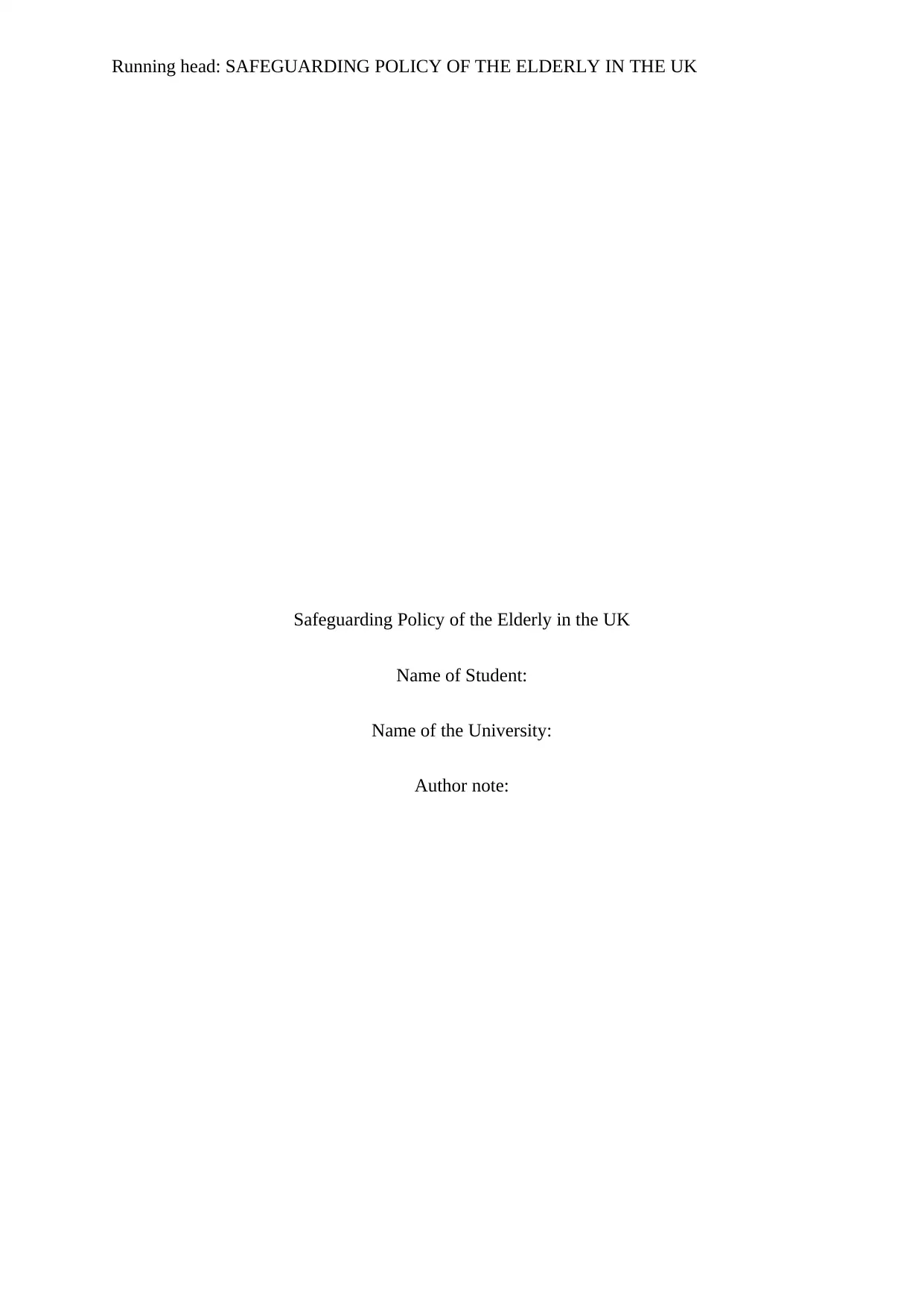
Running head: SAFEGUARDING POLICY OF THE ELDERLY IN THE UK
Safeguarding Policy of the Elderly in the UK
Name of Student:
Name of the University:
Author note:
Safeguarding Policy of the Elderly in the UK
Name of Student:
Name of the University:
Author note:
Paraphrase This Document
Need a fresh take? Get an instant paraphrase of this document with our AI Paraphraser
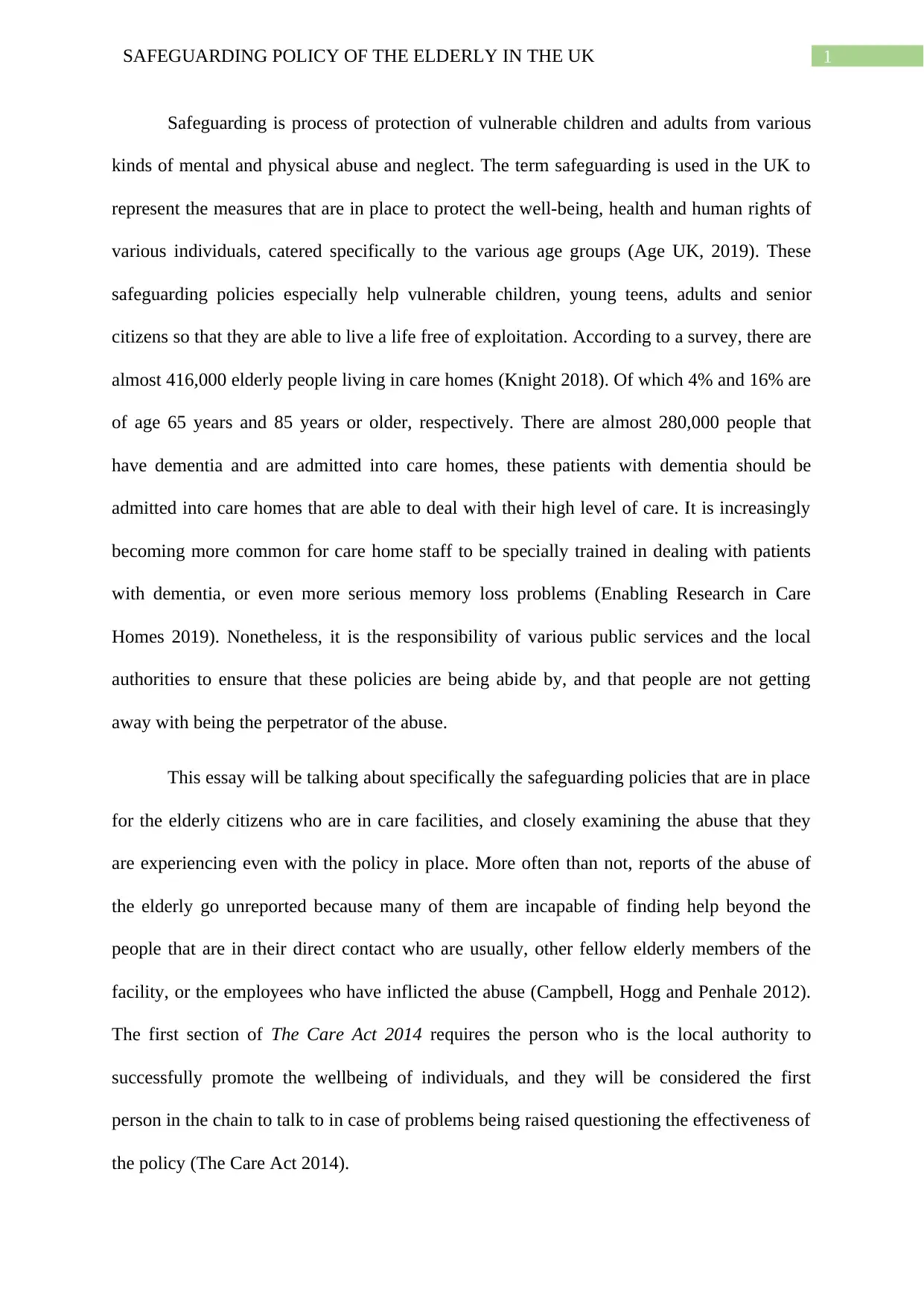
1SAFEGUARDING POLICY OF THE ELDERLY IN THE UK
Safeguarding is process of protection of vulnerable children and adults from various
kinds of mental and physical abuse and neglect. The term safeguarding is used in the UK to
represent the measures that are in place to protect the well-being, health and human rights of
various individuals, catered specifically to the various age groups (Age UK, 2019). These
safeguarding policies especially help vulnerable children, young teens, adults and senior
citizens so that they are able to live a life free of exploitation. According to a survey, there are
almost 416,000 elderly people living in care homes (Knight 2018). Of which 4% and 16% are
of age 65 years and 85 years or older, respectively. There are almost 280,000 people that
have dementia and are admitted into care homes, these patients with dementia should be
admitted into care homes that are able to deal with their high level of care. It is increasingly
becoming more common for care home staff to be specially trained in dealing with patients
with dementia, or even more serious memory loss problems (Enabling Research in Care
Homes 2019). Nonetheless, it is the responsibility of various public services and the local
authorities to ensure that these policies are being abide by, and that people are not getting
away with being the perpetrator of the abuse.
This essay will be talking about specifically the safeguarding policies that are in place
for the elderly citizens who are in care facilities, and closely examining the abuse that they
are experiencing even with the policy in place. More often than not, reports of the abuse of
the elderly go unreported because many of them are incapable of finding help beyond the
people that are in their direct contact who are usually, other fellow elderly members of the
facility, or the employees who have inflicted the abuse (Campbell, Hogg and Penhale 2012).
The first section of The Care Act 2014 requires the person who is the local authority to
successfully promote the wellbeing of individuals, and they will be considered the first
person in the chain to talk to in case of problems being raised questioning the effectiveness of
the policy (The Care Act 2014).
Safeguarding is process of protection of vulnerable children and adults from various
kinds of mental and physical abuse and neglect. The term safeguarding is used in the UK to
represent the measures that are in place to protect the well-being, health and human rights of
various individuals, catered specifically to the various age groups (Age UK, 2019). These
safeguarding policies especially help vulnerable children, young teens, adults and senior
citizens so that they are able to live a life free of exploitation. According to a survey, there are
almost 416,000 elderly people living in care homes (Knight 2018). Of which 4% and 16% are
of age 65 years and 85 years or older, respectively. There are almost 280,000 people that
have dementia and are admitted into care homes, these patients with dementia should be
admitted into care homes that are able to deal with their high level of care. It is increasingly
becoming more common for care home staff to be specially trained in dealing with patients
with dementia, or even more serious memory loss problems (Enabling Research in Care
Homes 2019). Nonetheless, it is the responsibility of various public services and the local
authorities to ensure that these policies are being abide by, and that people are not getting
away with being the perpetrator of the abuse.
This essay will be talking about specifically the safeguarding policies that are in place
for the elderly citizens who are in care facilities, and closely examining the abuse that they
are experiencing even with the policy in place. More often than not, reports of the abuse of
the elderly go unreported because many of them are incapable of finding help beyond the
people that are in their direct contact who are usually, other fellow elderly members of the
facility, or the employees who have inflicted the abuse (Campbell, Hogg and Penhale 2012).
The first section of The Care Act 2014 requires the person who is the local authority to
successfully promote the wellbeing of individuals, and they will be considered the first
person in the chain to talk to in case of problems being raised questioning the effectiveness of
the policy (The Care Act 2014).

2SAFEGUARDING POLICY OF THE ELDERLY IN THE UK
The abuse of the elderly is considered a very serious social problem that is addressed
in various legislations and policy documents. It was only after 1988 that the UK has started
considering the abuse and neglect of elders in constitutional facilities as a problem, after the
British Geriatric Society put forward this issue in a national conference held in London. The
Health and Social Care Act (HSCA) includes clauses that ensure the quality of care and
assign new responsibilities to the institutions under the Care Quality Commission (Care
Quality Commission UK 2018). Abuse and neglect can be of various forms, not necessarily
being physically inflicted but can also include failure to undertake various care tasks that
affect the livelihood of the elderly person in care. It is difficult to list down the various types
of abuse that can occur, because the definition of abuse is relative to many people. However,
the usual types of abuse include emotional and psychological harm caused to the individual,
and also harming one’s personal belongings and properties. Since this essay is focusing on
the abuse of elderly persons in healthcare institutes, and in places where care is taking place
on a 24/7 basis, the focus on safeguarding the patients should be at the top of the priority list.
Families leave their loved ones in these facilities trusting in the fact that the institution will be
able to give them a home-like care that they are not able to at home. It is important for all
organisations to have a safeguarding policy for adults, and make sure that they practice the
best framework version of the policy (Age UK 2019).
It is also important for the employees of an organization to be properly training in
safeguarding. A successful safeguarding caretaker will be able to detect instances of abuse
and neglect, make sure the staff is also equally educated about situations, and needs to
understand the standard procedure that needs to take place if ever a problem arises in the
workplace that violates the terms of the safeguarding policy. As important as it is for the
institute as a whole to be well equipped and educated when dealing with a patient that has
extra needs, it is also important for the institution to ensure that these patients are getting the
The abuse of the elderly is considered a very serious social problem that is addressed
in various legislations and policy documents. It was only after 1988 that the UK has started
considering the abuse and neglect of elders in constitutional facilities as a problem, after the
British Geriatric Society put forward this issue in a national conference held in London. The
Health and Social Care Act (HSCA) includes clauses that ensure the quality of care and
assign new responsibilities to the institutions under the Care Quality Commission (Care
Quality Commission UK 2018). Abuse and neglect can be of various forms, not necessarily
being physically inflicted but can also include failure to undertake various care tasks that
affect the livelihood of the elderly person in care. It is difficult to list down the various types
of abuse that can occur, because the definition of abuse is relative to many people. However,
the usual types of abuse include emotional and psychological harm caused to the individual,
and also harming one’s personal belongings and properties. Since this essay is focusing on
the abuse of elderly persons in healthcare institutes, and in places where care is taking place
on a 24/7 basis, the focus on safeguarding the patients should be at the top of the priority list.
Families leave their loved ones in these facilities trusting in the fact that the institution will be
able to give them a home-like care that they are not able to at home. It is important for all
organisations to have a safeguarding policy for adults, and make sure that they practice the
best framework version of the policy (Age UK 2019).
It is also important for the employees of an organization to be properly training in
safeguarding. A successful safeguarding caretaker will be able to detect instances of abuse
and neglect, make sure the staff is also equally educated about situations, and needs to
understand the standard procedure that needs to take place if ever a problem arises in the
workplace that violates the terms of the safeguarding policy. As important as it is for the
institute as a whole to be well equipped and educated when dealing with a patient that has
extra needs, it is also important for the institution to ensure that these patients are getting the
⊘ This is a preview!⊘
Do you want full access?
Subscribe today to unlock all pages.

Trusted by 1+ million students worldwide
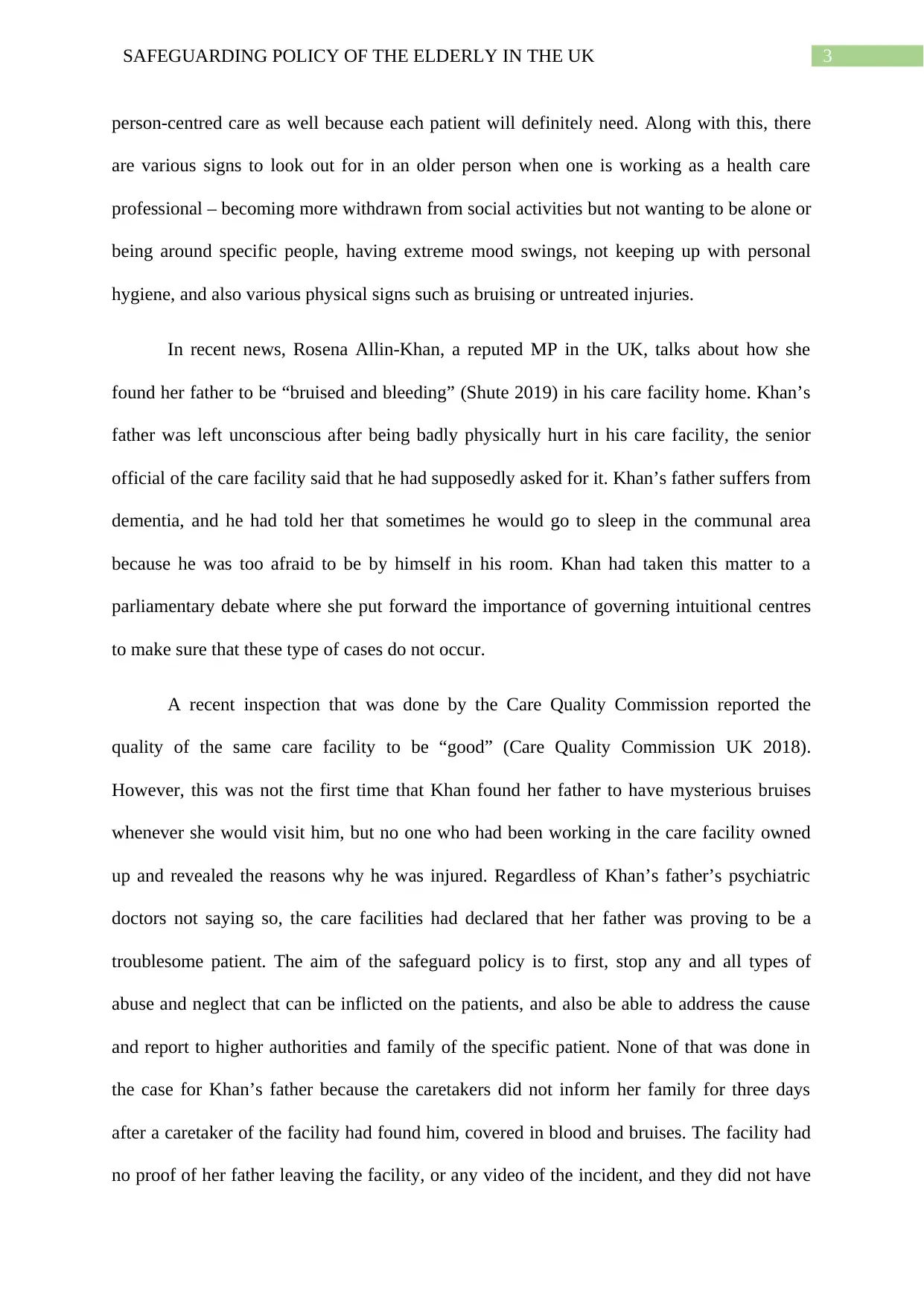
3SAFEGUARDING POLICY OF THE ELDERLY IN THE UK
person-centred care as well because each patient will definitely need. Along with this, there
are various signs to look out for in an older person when one is working as a health care
professional – becoming more withdrawn from social activities but not wanting to be alone or
being around specific people, having extreme mood swings, not keeping up with personal
hygiene, and also various physical signs such as bruising or untreated injuries.
In recent news, Rosena Allin-Khan, a reputed MP in the UK, talks about how she
found her father to be “bruised and bleeding” (Shute 2019) in his care facility home. Khan’s
father was left unconscious after being badly physically hurt in his care facility, the senior
official of the care facility said that he had supposedly asked for it. Khan’s father suffers from
dementia, and he had told her that sometimes he would go to sleep in the communal area
because he was too afraid to be by himself in his room. Khan had taken this matter to a
parliamentary debate where she put forward the importance of governing intuitional centres
to make sure that these type of cases do not occur.
A recent inspection that was done by the Care Quality Commission reported the
quality of the same care facility to be “good” (Care Quality Commission UK 2018).
However, this was not the first time that Khan found her father to have mysterious bruises
whenever she would visit him, but no one who had been working in the care facility owned
up and revealed the reasons why he was injured. Regardless of Khan’s father’s psychiatric
doctors not saying so, the care facilities had declared that her father was proving to be a
troublesome patient. The aim of the safeguard policy is to first, stop any and all types of
abuse and neglect that can be inflicted on the patients, and also be able to address the cause
and report to higher authorities and family of the specific patient. None of that was done in
the case for Khan’s father because the caretakers did not inform her family for three days
after a caretaker of the facility had found him, covered in blood and bruises. The facility had
no proof of her father leaving the facility, or any video of the incident, and they did not have
person-centred care as well because each patient will definitely need. Along with this, there
are various signs to look out for in an older person when one is working as a health care
professional – becoming more withdrawn from social activities but not wanting to be alone or
being around specific people, having extreme mood swings, not keeping up with personal
hygiene, and also various physical signs such as bruising or untreated injuries.
In recent news, Rosena Allin-Khan, a reputed MP in the UK, talks about how she
found her father to be “bruised and bleeding” (Shute 2019) in his care facility home. Khan’s
father was left unconscious after being badly physically hurt in his care facility, the senior
official of the care facility said that he had supposedly asked for it. Khan’s father suffers from
dementia, and he had told her that sometimes he would go to sleep in the communal area
because he was too afraid to be by himself in his room. Khan had taken this matter to a
parliamentary debate where she put forward the importance of governing intuitional centres
to make sure that these type of cases do not occur.
A recent inspection that was done by the Care Quality Commission reported the
quality of the same care facility to be “good” (Care Quality Commission UK 2018).
However, this was not the first time that Khan found her father to have mysterious bruises
whenever she would visit him, but no one who had been working in the care facility owned
up and revealed the reasons why he was injured. Regardless of Khan’s father’s psychiatric
doctors not saying so, the care facilities had declared that her father was proving to be a
troublesome patient. The aim of the safeguard policy is to first, stop any and all types of
abuse and neglect that can be inflicted on the patients, and also be able to address the cause
and report to higher authorities and family of the specific patient. None of that was done in
the case for Khan’s father because the caretakers did not inform her family for three days
after a caretaker of the facility had found him, covered in blood and bruises. The facility had
no proof of her father leaving the facility, or any video of the incident, and they did not have
Paraphrase This Document
Need a fresh take? Get an instant paraphrase of this document with our AI Paraphraser
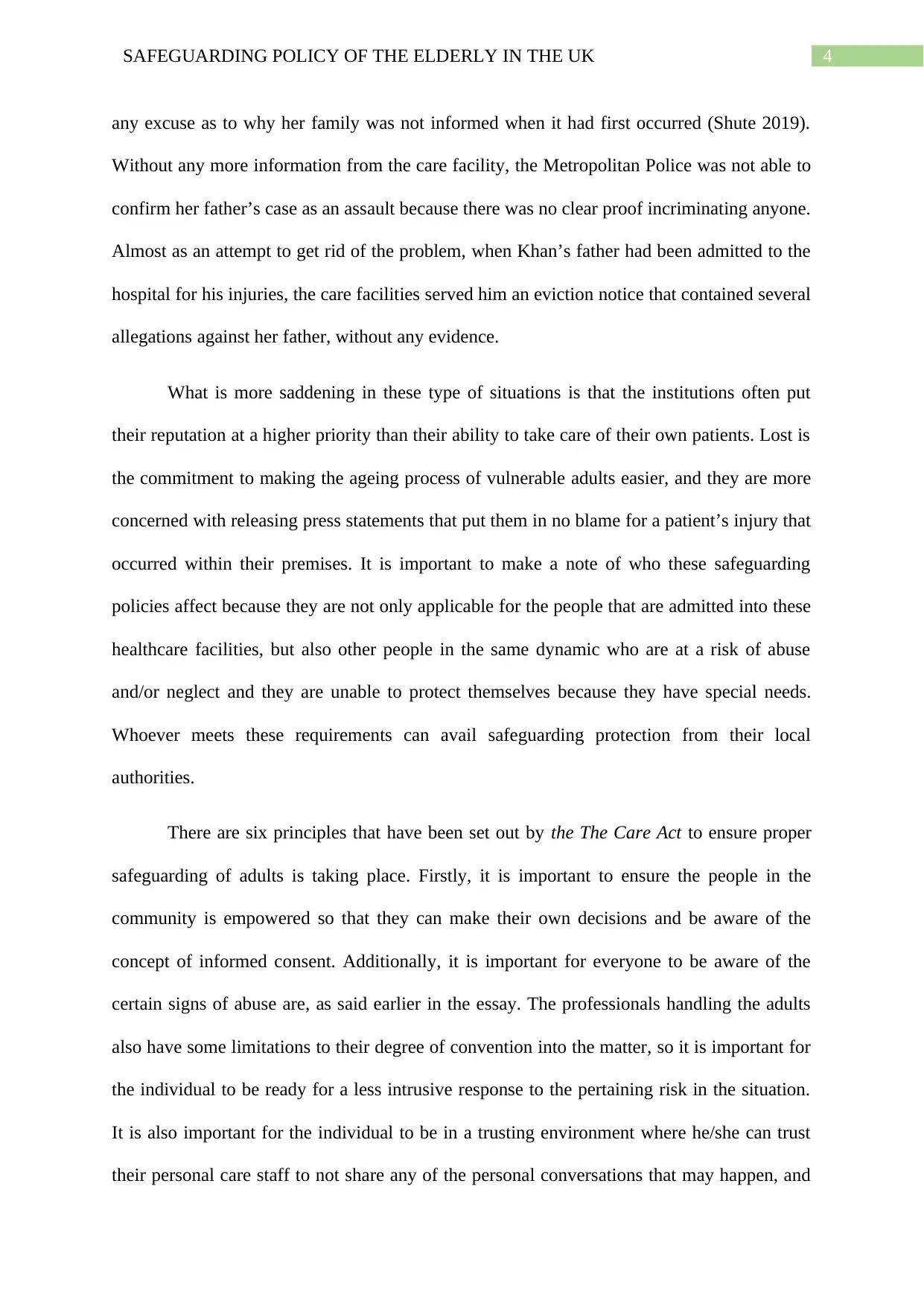
4SAFEGUARDING POLICY OF THE ELDERLY IN THE UK
any excuse as to why her family was not informed when it had first occurred (Shute 2019).
Without any more information from the care facility, the Metropolitan Police was not able to
confirm her father’s case as an assault because there was no clear proof incriminating anyone.
Almost as an attempt to get rid of the problem, when Khan’s father had been admitted to the
hospital for his injuries, the care facilities served him an eviction notice that contained several
allegations against her father, without any evidence.
What is more saddening in these type of situations is that the institutions often put
their reputation at a higher priority than their ability to take care of their own patients. Lost is
the commitment to making the ageing process of vulnerable adults easier, and they are more
concerned with releasing press statements that put them in no blame for a patient’s injury that
occurred within their premises. It is important to make a note of who these safeguarding
policies affect because they are not only applicable for the people that are admitted into these
healthcare facilities, but also other people in the same dynamic who are at a risk of abuse
and/or neglect and they are unable to protect themselves because they have special needs.
Whoever meets these requirements can avail safeguarding protection from their local
authorities.
There are six principles that have been set out by the The Care Act to ensure proper
safeguarding of adults is taking place. Firstly, it is important to ensure the people in the
community is empowered so that they can make their own decisions and be aware of the
concept of informed consent. Additionally, it is important for everyone to be aware of the
certain signs of abuse are, as said earlier in the essay. The professionals handling the adults
also have some limitations to their degree of convention into the matter, so it is important for
the individual to be ready for a less intrusive response to the pertaining risk in the situation.
It is also important for the individual to be in a trusting environment where he/she can trust
their personal care staff to not share any of the personal conversations that may happen, and
any excuse as to why her family was not informed when it had first occurred (Shute 2019).
Without any more information from the care facility, the Metropolitan Police was not able to
confirm her father’s case as an assault because there was no clear proof incriminating anyone.
Almost as an attempt to get rid of the problem, when Khan’s father had been admitted to the
hospital for his injuries, the care facilities served him an eviction notice that contained several
allegations against her father, without any evidence.
What is more saddening in these type of situations is that the institutions often put
their reputation at a higher priority than their ability to take care of their own patients. Lost is
the commitment to making the ageing process of vulnerable adults easier, and they are more
concerned with releasing press statements that put them in no blame for a patient’s injury that
occurred within their premises. It is important to make a note of who these safeguarding
policies affect because they are not only applicable for the people that are admitted into these
healthcare facilities, but also other people in the same dynamic who are at a risk of abuse
and/or neglect and they are unable to protect themselves because they have special needs.
Whoever meets these requirements can avail safeguarding protection from their local
authorities.
There are six principles that have been set out by the The Care Act to ensure proper
safeguarding of adults is taking place. Firstly, it is important to ensure the people in the
community is empowered so that they can make their own decisions and be aware of the
concept of informed consent. Additionally, it is important for everyone to be aware of the
certain signs of abuse are, as said earlier in the essay. The professionals handling the adults
also have some limitations to their degree of convention into the matter, so it is important for
the individual to be ready for a less intrusive response to the pertaining risk in the situation.
It is also important for the individual to be in a trusting environment where he/she can trust
their personal care staff to not share any of the personal conversations that may happen, and

5SAFEGUARDING POLICY OF THE ELDERLY IN THE UK
only share if it is necessary and is concerning the health of the individual. And lastly, the
vulnerable adult in question should be aware of what roles are played by the staff around
them, and who they would need to speak to in case something happens (The Care Act 2014).
However, in the case of Khan’s father who is suffering from dementia, it gets very
difficult for them to know this because most of the time, they are not clearly aware of what is
happening in their life. A survey conducted by the Social Care Institute for Excellence
showed that out of all the people more than 50% do not know enough about dementia to be
able to assist someone with it. In the healthcare world, diseases like dementia and
Alzheimer’s are known as the ‘beasts’ (Social Care Institute for Excellence 2015). Due to
their condition, people who have dementia are awfully vulnerable because even the early
onset of the disease can have a great impact on their ability to communicate and their
reasoning skills also take an equal blow (Manthorpe and Martineau 2014). When this
happens, they are able to neither understand nor try to explain to others what is happening
with them.
For the case of Khan’s father, there should have been proper surveillance on his
movements and better care taking from the staff at the home. Even though the institute that he
was admitted into was an extra care home, they were unable to consider all these factors
when caring for her father. The care institute also was not able to fully analyse their
employees because that would be the only way that her father had the injuries he did - an
employee who ran out of patience.
only share if it is necessary and is concerning the health of the individual. And lastly, the
vulnerable adult in question should be aware of what roles are played by the staff around
them, and who they would need to speak to in case something happens (The Care Act 2014).
However, in the case of Khan’s father who is suffering from dementia, it gets very
difficult for them to know this because most of the time, they are not clearly aware of what is
happening in their life. A survey conducted by the Social Care Institute for Excellence
showed that out of all the people more than 50% do not know enough about dementia to be
able to assist someone with it. In the healthcare world, diseases like dementia and
Alzheimer’s are known as the ‘beasts’ (Social Care Institute for Excellence 2015). Due to
their condition, people who have dementia are awfully vulnerable because even the early
onset of the disease can have a great impact on their ability to communicate and their
reasoning skills also take an equal blow (Manthorpe and Martineau 2014). When this
happens, they are able to neither understand nor try to explain to others what is happening
with them.
For the case of Khan’s father, there should have been proper surveillance on his
movements and better care taking from the staff at the home. Even though the institute that he
was admitted into was an extra care home, they were unable to consider all these factors
when caring for her father. The care institute also was not able to fully analyse their
employees because that would be the only way that her father had the injuries he did - an
employee who ran out of patience.
⊘ This is a preview!⊘
Do you want full access?
Subscribe today to unlock all pages.

Trusted by 1+ million students worldwide
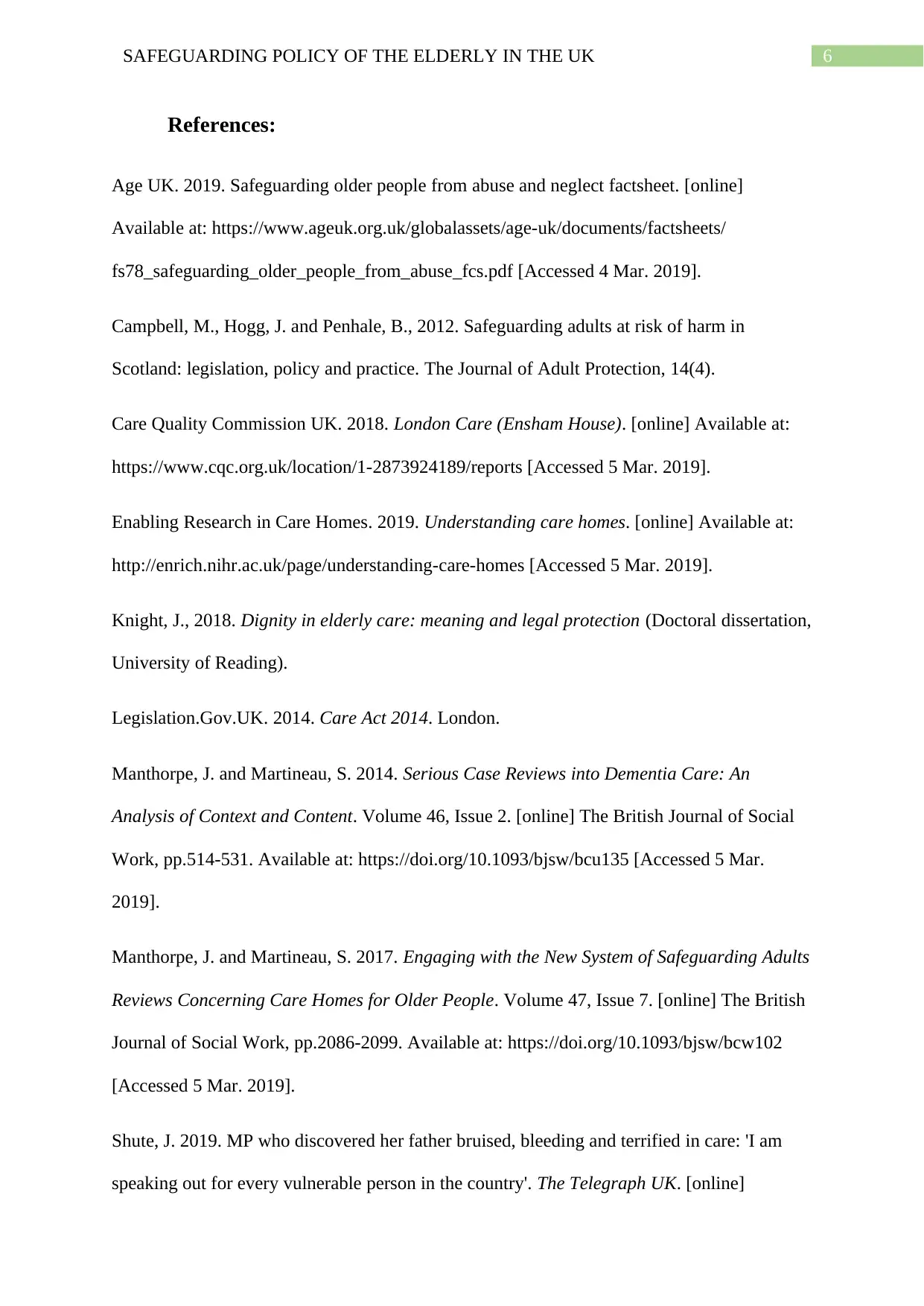
6SAFEGUARDING POLICY OF THE ELDERLY IN THE UK
References:
Age UK. 2019. Safeguarding older people from abuse and neglect factsheet. [online]
Available at: https://www.ageuk.org.uk/globalassets/age-uk/documents/factsheets/
fs78_safeguarding_older_people_from_abuse_fcs.pdf [Accessed 4 Mar. 2019].
Campbell, M., Hogg, J. and Penhale, B., 2012. Safeguarding adults at risk of harm in
Scotland: legislation, policy and practice. The Journal of Adult Protection, 14(4).
Care Quality Commission UK. 2018. London Care (Ensham House). [online] Available at:
https://www.cqc.org.uk/location/1-2873924189/reports [Accessed 5 Mar. 2019].
Enabling Research in Care Homes. 2019. Understanding care homes. [online] Available at:
http://enrich.nihr.ac.uk/page/understanding-care-homes [Accessed 5 Mar. 2019].
Knight, J., 2018. Dignity in elderly care: meaning and legal protection (Doctoral dissertation,
University of Reading).
Legislation.Gov.UK. 2014. Care Act 2014. London.
Manthorpe, J. and Martineau, S. 2014. Serious Case Reviews into Dementia Care: An
Analysis of Context and Content. Volume 46, Issue 2. [online] The British Journal of Social
Work, pp.514-531. Available at: https://doi.org/10.1093/bjsw/bcu135 [Accessed 5 Mar.
2019].
Manthorpe, J. and Martineau, S. 2017. Engaging with the New System of Safeguarding Adults
Reviews Concerning Care Homes for Older People. Volume 47, Issue 7. [online] The British
Journal of Social Work, pp.2086-2099. Available at: https://doi.org/10.1093/bjsw/bcw102
[Accessed 5 Mar. 2019].
Shute, J. 2019. MP who discovered her father bruised, bleeding and terrified in care: 'I am
speaking out for every vulnerable person in the country'. The Telegraph UK. [online]
References:
Age UK. 2019. Safeguarding older people from abuse and neglect factsheet. [online]
Available at: https://www.ageuk.org.uk/globalassets/age-uk/documents/factsheets/
fs78_safeguarding_older_people_from_abuse_fcs.pdf [Accessed 4 Mar. 2019].
Campbell, M., Hogg, J. and Penhale, B., 2012. Safeguarding adults at risk of harm in
Scotland: legislation, policy and practice. The Journal of Adult Protection, 14(4).
Care Quality Commission UK. 2018. London Care (Ensham House). [online] Available at:
https://www.cqc.org.uk/location/1-2873924189/reports [Accessed 5 Mar. 2019].
Enabling Research in Care Homes. 2019. Understanding care homes. [online] Available at:
http://enrich.nihr.ac.uk/page/understanding-care-homes [Accessed 5 Mar. 2019].
Knight, J., 2018. Dignity in elderly care: meaning and legal protection (Doctoral dissertation,
University of Reading).
Legislation.Gov.UK. 2014. Care Act 2014. London.
Manthorpe, J. and Martineau, S. 2014. Serious Case Reviews into Dementia Care: An
Analysis of Context and Content. Volume 46, Issue 2. [online] The British Journal of Social
Work, pp.514-531. Available at: https://doi.org/10.1093/bjsw/bcu135 [Accessed 5 Mar.
2019].
Manthorpe, J. and Martineau, S. 2017. Engaging with the New System of Safeguarding Adults
Reviews Concerning Care Homes for Older People. Volume 47, Issue 7. [online] The British
Journal of Social Work, pp.2086-2099. Available at: https://doi.org/10.1093/bjsw/bcw102
[Accessed 5 Mar. 2019].
Shute, J. 2019. MP who discovered her father bruised, bleeding and terrified in care: 'I am
speaking out for every vulnerable person in the country'. The Telegraph UK. [online]
Paraphrase This Document
Need a fresh take? Get an instant paraphrase of this document with our AI Paraphraser
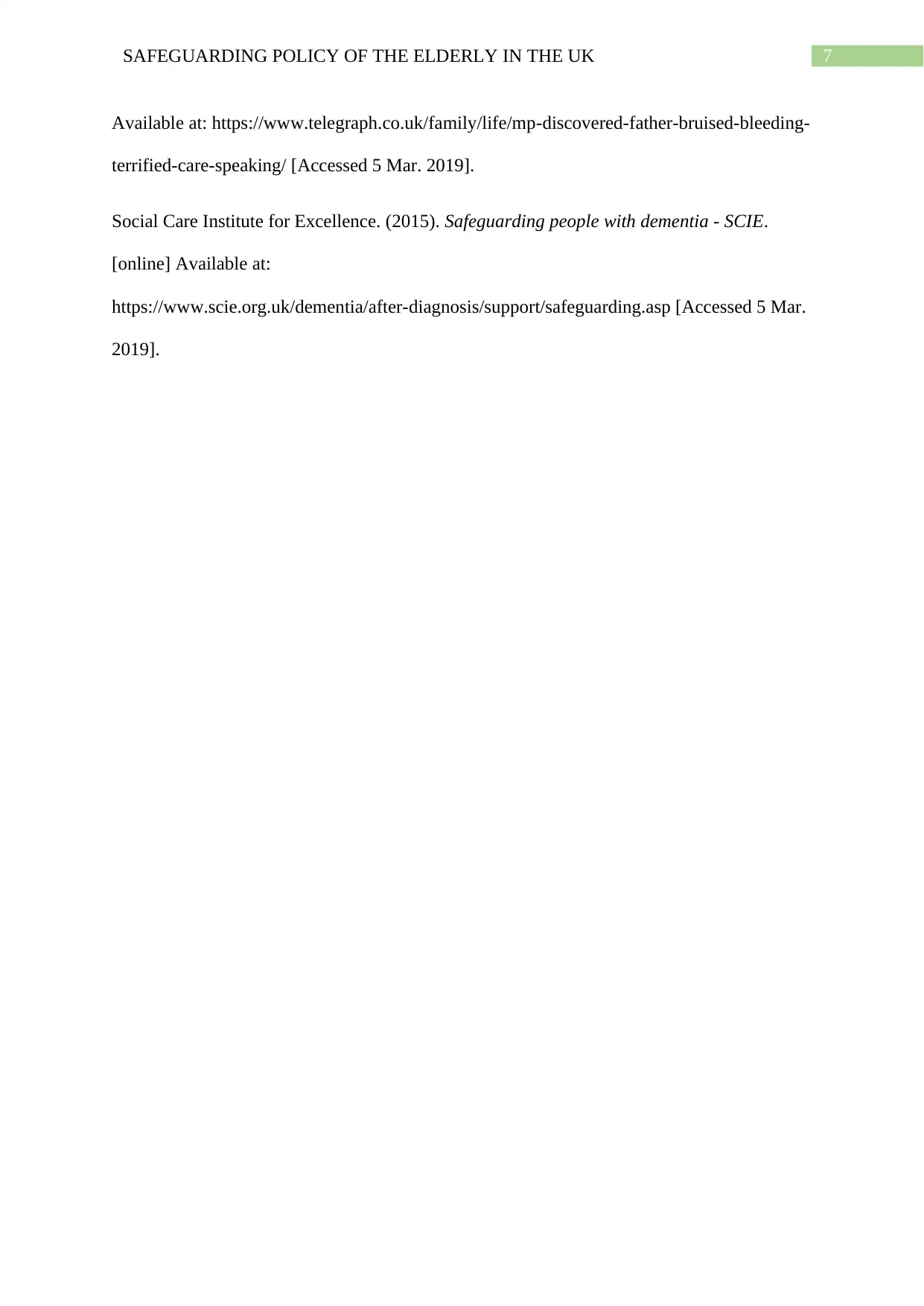
7SAFEGUARDING POLICY OF THE ELDERLY IN THE UK
Available at: https://www.telegraph.co.uk/family/life/mp-discovered-father-bruised-bleeding-
terrified-care-speaking/ [Accessed 5 Mar. 2019].
Social Care Institute for Excellence. (2015). Safeguarding people with dementia - SCIE.
[online] Available at:
https://www.scie.org.uk/dementia/after-diagnosis/support/safeguarding.asp [Accessed 5 Mar.
2019].
Available at: https://www.telegraph.co.uk/family/life/mp-discovered-father-bruised-bleeding-
terrified-care-speaking/ [Accessed 5 Mar. 2019].
Social Care Institute for Excellence. (2015). Safeguarding people with dementia - SCIE.
[online] Available at:
https://www.scie.org.uk/dementia/after-diagnosis/support/safeguarding.asp [Accessed 5 Mar.
2019].
1 out of 8
Related Documents
Your All-in-One AI-Powered Toolkit for Academic Success.
+13062052269
info@desklib.com
Available 24*7 on WhatsApp / Email
![[object Object]](/_next/static/media/star-bottom.7253800d.svg)
Unlock your academic potential
Copyright © 2020–2026 A2Z Services. All Rights Reserved. Developed and managed by ZUCOL.




